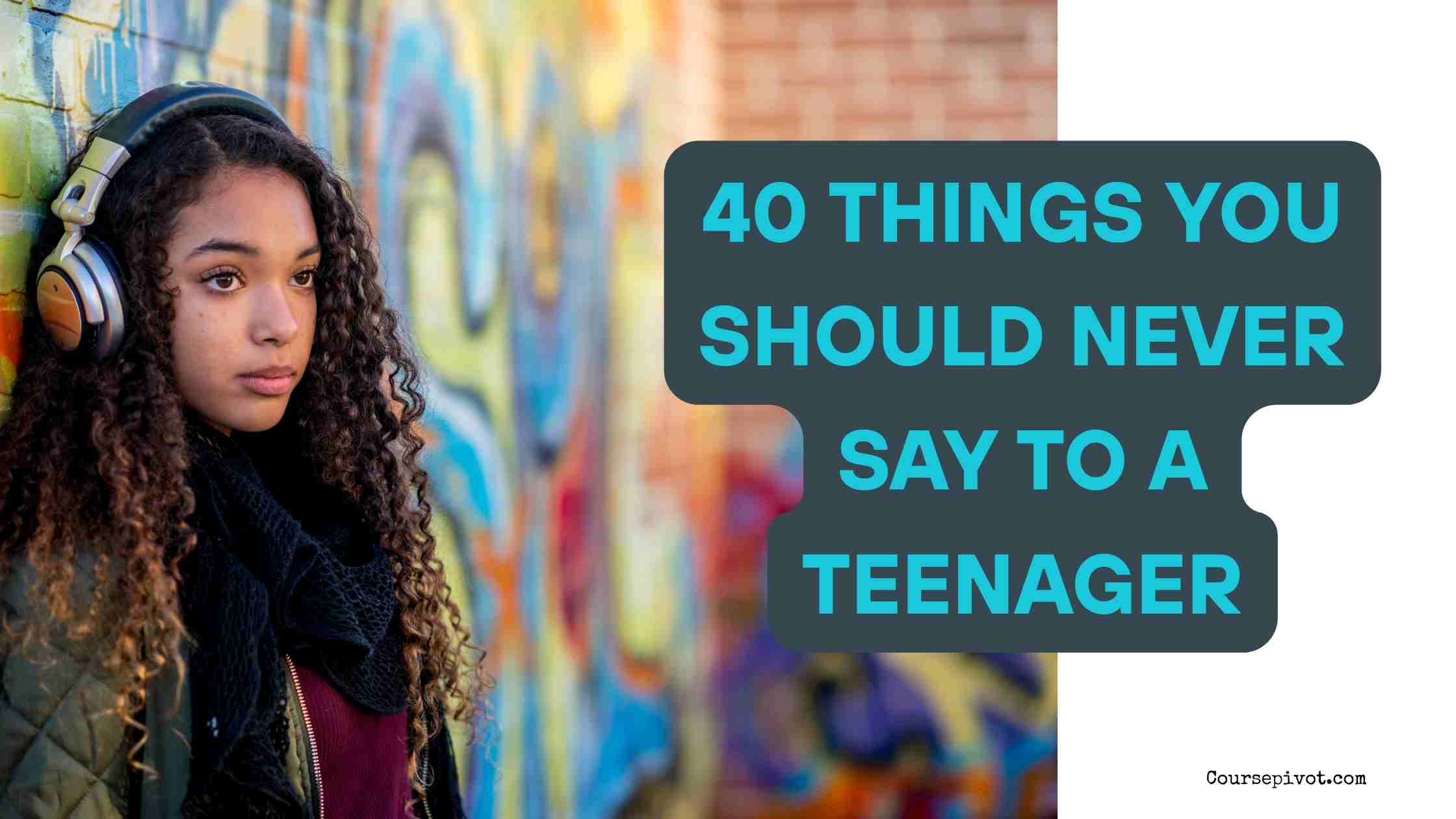
40 Things You Should Never Say to a Teenager
Teenagers are in a constant state of growth—physically, emotionally, and mentally. They’re figuring out who they are, how the world works, and how they fit into it. And while they might seem tough on the outside, words can cut deep.
Sometimes, what we say out of concern, habit, or even humor can do more harm than good. Teenagers remember what you say—especially when it stings. They may not always show it, but your words have weight.
Read our top blogs on: 8 Things You Should Never Say to Your Partner
So if you want to build trust, not tension, here’s a list of 40 things you should never say to a teenager—even when tempted.
Think of this as a gentle warning sign to protect their self-esteem, confidence, and individuality.
🔢 40 Things You Should Never Say to a Teenager
1️⃣ “Because I said so.”
2️⃣ “You’re too young to understand.”
3️⃣ “When I was your age…”
4️⃣ “You don’t know what real problems are.”
5️⃣ “You’re being dramatic.”
6️⃣ “You’re just lazy.”
7️⃣ “You’re not even trying.”
8️⃣ “Why can’t you be more like your sibling?”
9️⃣ “That’s not a real career.”
🔟 “Stop crying. It’s not that serious.”
1️⃣1️⃣ “You’ll grow out of this phase.”
1️⃣2️⃣ “You always mess things up.”
1️⃣3️⃣ “You shouldn’t feel that way.”
1️⃣4️⃣ “You have it so easy.”
1️⃣5️⃣ “You’re grounded for life.”
1️⃣6️⃣ “What do you even know about love?”
1️⃣7️⃣ “You’re not allowed to feel depressed.”
1️⃣8️⃣ “That’s not how girls/boys are supposed to act.”
1️⃣9️⃣ “You’re embarrassing.”
2️⃣0️⃣ “You’re going to ruin your life.”
2️⃣1️⃣ “That’s a stupid idea.”
2️⃣2️⃣ “You’re being too sensitive.”
2️⃣3️⃣ “You don’t need privacy.”
2️⃣4️⃣ “You can’t do anything right.”
2️⃣5️⃣ “You’re such a disappointment.”
2️⃣6️⃣ “You don’t look good in that.”
2️⃣7️⃣ “You’ll never make it in that field.”
2️⃣8️⃣ “You’ll understand when you’re older.”
2️⃣9️⃣ “You need to lose weight.”
3️⃣0️⃣ “You’re too skinny.”
3️⃣1️⃣ “Why do you care what your friends think?”
3️⃣2️⃣ “I don’t have time for your problems.”
3️⃣3️⃣ “I wish you were more mature.”
3️⃣4️⃣ “You’re too emotional.”
3️⃣5️⃣ “You don’t try hard enough.”
3️⃣6️⃣ “You’re going to end up like [negative example].”
3️⃣7️⃣ “Get over it.”
3️⃣8️⃣ “That’s not something to be anxious about.”
3️⃣9️⃣ “No one else your age complains about this.”
4️⃣0️⃣ “You’re being ridiculous.”
Teenagers may test limits, push buttons, or act like they don’t care—but underneath it all, they’re just trying to be understood. And believe it or not, they are listening. They’re absorbing everything you say, not just the words but the tone, the timing, and the intention behind them. What might feel like a passing comment to you could echo in their minds for days, weeks, or even years.
Words can heal or harm. They can build bridges or create lifelong emotional distance. Once spoken, they can’t be unsaid. That’s why it’s so important to choose them wisely—especially when dealing with a teenager who’s learning how to interpret the world and their place in it.
Avoiding these 40 phrases isn’t about walking on eggshells or being overly cautious. It’s about being intentional. Being empathetic. It’s about recognizing the power of language and how deeply it shapes a young person’s sense of self-worth and identity.
When we communicate with care, we teach them that their feelings matter. That their voices are valid. That even when they’re wrong, they’re not worthless. When we avoid harmful phrases and choose supportive, encouraging language instead, we become someone they trust—not fear.
Why Does It Matter What You Say to a Teenager?
Because words shape their world.
Teenagers are not just “big kids” or “mini adults.” They’re in one of the most critical developmental stages of life—emotionally, mentally, and even neurologically. Their brains are still forming, particularly the parts that manage decision-making, self-control, and emotional regulation.
That means what you say to a teenager sticks, often far more deeply than it would to an adult. One careless comment can plant a seed of self-doubt. One kind word can inspire confidence for life.
Here’s why your words matter so much:
- Teenagers are building their identity.
What you say becomes part of their internal narrative. If they hear “you’re lazy” often enough, they may start to believe it—even if it isn’t true. - They are emotionally sensitive.
Teenagers feel things more intensely than adults. A joke at their expense might feel like a personal attack. Praise might feel like the first validation they’ve ever truly believed. - They crave respect.
They’re learning to think independently and want to be treated like individuals with thoughts that matter. Words that dismiss or belittle them can cause emotional distance or rebellion. - They remember.
Even offhanded remarks—“You’re too sensitive,” “You’ll never make it,” or “You always mess up”—can echo in their heads long after they’re spoken. - You are still a powerful influence.
Even if they roll their eyes or pretend not to care, teens still look to parents, teachers, and mentors for approval, validation, and emotional safety. Your words are louder than you think.
Want to connect with a teenager? Want to be someone they confide in rather than hide from?
Start by choosing your words like they matter—because to them, they really do.
And in a world that often talks at teenagers, be the rare person who talks with them.
Sometimes, saying less is better. But saying the right thing? That’s unforgettable.
Cite this article
You can copy and paste your preferred citation format below.
Martin, L. & Arquette, E.. (2025, May 16). 40 Things You Should Never Say to a Teenager. Coursepivot.com. https://coursepivot.com/blog/40-things-you-should-never-say-to-a-teenager/



